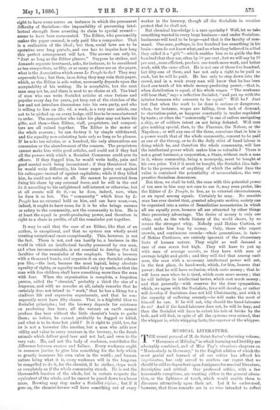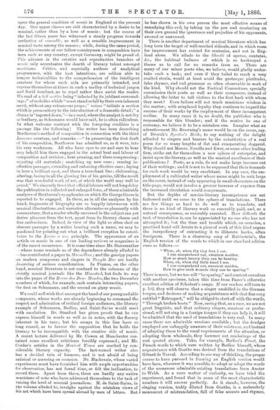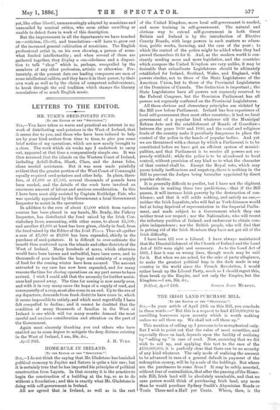MUSICAL LITERATURE.
THE recent perusal of M. de Saint-Saens's charming volume, " Harmonic et M6lodie," in which learning and lucidity are admirably combined, and of Miss Fay's vivacious chapters on "Music-study in Germany," to the English edition of which the most genial and learned of all our critics has affixed his imprimatur, has only served to confirm our regret that we should be still so dependent upon foreigners for musical literature, descriptive and critical. Our professed critics, with a few honourable exceptions, are wanting either in the general educa- tion, or the lightness of touch, which would enable them to discourse attractively upon their art. Let it be understood, however, that these remarks are in no wise intended to reflect upon the general condition of music in England at the present day. Our upper classes are still characterised by a desire to be musical, rather than by a love of music ; but the course of the last fifteen years has witnessed a steady progress towards perfection of ensemble, as well as a sensible improvement in musical taste among the masses ; while, during the same period, the achievements of our fellow-countrymen in composition have been such as any country, except Germany, might be proud of. This advance in the creative and reproductive branches of music only accentuates the dearth of literary talent amongst musicians. Critics, and especially authors of analytical programmes, with the best intentions, are seldom able to temper technicalities to the comprehension of the intelligent amateur for whom such aids are primarily intended, and express themselves at times in such a medley of technical jargon and florid bombast, as to repel rather than assist the reader. We read of a kit motive being" infected by its jubilant surround- ings;" of melodies which "must stand or fall by their own inherent merit, without any extraneous props ;" voices "initiate a section which is premonitory to the introduction of a dramatic detail ;" a climax is " tapered down,"—in a word, where the analyst is not dry or leathery, as Schumann would have said, he is often ridiculous. In what welcome contrast with the foregoing crudities is a passage like the following ! The writer has been describing Beethoven's method of composition in connection with the third Leonora overture, and remarks :—" In preserving the first draft of his composition, Beethoven has admitted us, as it were, into his very workroom. All who have eyes to see and ears to bear may behold him there engaged in the actual heat and labour of composition and revision ; here pruning, and there compressing ; rejecting old materials ; snatching up new ones ; erasing in- effective passages, extending and enforcing effective ones ; laying in here a brilliant spot, and there a trenchant line ; elaborating, altering, fusing in all the glowing fire of his genius, till the result was that wonderful work of art, of which the world may well be proud." We sincerely trust that official labours will not long delay the publication in collected and enlarged form, of those admirable analyses of Beethoven's symphonies on which Sir George Grove is reported to be engaged. In these, as in all the analyses by his hand, fragments of biography are so happily interwoven with musical illustrations, and narrative alternates so pleasantly with -commentary, that a reader wholly unversed in the subject can yet derive pleasure from the text, apart from its literary charm and fine enthusiasm. Indeed, in view of the light so often shed on obscure passages by a writer bearing such a name, we may be pardoned for pointing out what a brilliant exception he consti- tutes to the Lacus a 710 ti principle. The appearance of an article on music in one of our leading reviews or magazines is of the rarest occurrence. It is some time since Mr. Dannreuther —whose name reminds us of the dependence already alluded to —has contributed a paper to Macmillan ; and the gossipy papers on modern composers and singers in Temple Bar are hardly deserving of serious consideration. In France, on the other hand, musical literature is not confined to the columns of the strictly musical journals like the Menestrel, but finds its way into the pages of the Revue des Deux blondes, the two December numbers of which, for example, each contain interesting papers, the first on Schumann, and the second on gipsy music.
We could well wish that amongst the band of our young and able composers, whose works are already beginning to command the respect and admiration of critical foreign audiences, the literary example of Schumann, Berlioz, and Saint-Saiins would meet with emulation. Dr. Stanford has given proofs that he can express himself in words as well as in notes, with the fluency inherent in his race ; but his essays in this line have so long ceased, as to favour the supposition that he holds the literary to be incompatible with the creative side of music. A recent lecture delivered by Mr. Cowen at Manchester con- tained some excellent criticisms forcibly expressed ; and Mr. Corder's articles in the Musical Times are marked by con- siderable literary capacity. The last-named writer also has a decided vein of humour, and is not afraid of being satirical or amusing on occasion. Mr. Mackenzie, whose varied experiences must have furnished him with ample opportunities for observation, has not found time, or felt the inclination, to record them. Apart from these, there are hardly any native musicians of note who have addressed themselves to the task of raising the level of musical journalism. M. de Saint-Saens, in the volume alluded to, inveighs against the mistaken views of his art which have been spread abroad by men of letters. But
he has shown in his own person the most effective means of remedying this evil, by taking up the pen and combating on their own ground the ignorance and prejudice of his opponents, avowed or unavowed.
There is another department of musical literature which has long been the target of well-merited ridicule, and in which room for improvement has existed for centuries, and not in Eng-
land alone. We allude to the libretti of operas, cantatas, &c., the habitual badness of which is so hackneyed a
theme as to call for no remarks from us. There are many of our minor poets who, we believe, would gladly under- take such a task ; and even if they failed to reach a very exalted strain, would at least avoid the grotesque platitudes, false rhymes, and bad grammar so often observable in work of the kind. Why should not the Festival Committees specially commission their poets as well as their composers, instead of allowing the latter to fall victims to the first hack with whom they meet ? Even failure will not teach musicians wisdom in the matter ; with misplaced loyalty they continue to imperil the success of their works by the employment of these incompetent scribes. In many cases it is, no doubt, the publisher who is responsible for this blunder ; and if the motive be one of
economy, we believe it to be a mistaken one. Imagine what an advertisement Mr. Browning's name would be on the cover, say, of Dvorak's Spectre's Bride, to say nothing of the delight
afforded to singers and hearers by the substitution of a real poem for so many lengths of flat and exasperating doggerel. Why should not Messrs. Novello and Ewer, or some other leading
firm, strike out for themselves a new sphere of enterprise, and insist upon the literary, as well as the musical excellence of their publications ? Poets, as a rule, do not make large incomes out of their writings ; audit is not to be supposed that their demands for such work would be very exorbitant. In any case, the em- ployment of a cultivated writer whose name might be writ large on the cover, instead of only appearing in small characters on the
title-page, would not involve a greater increase of expense than the increased circulation would compensate.
But the depths of musico-literary incompetence are not fathomed until we come to the sphere of translations. There are few things so hard to do well as to translate, and there is no kind of literary work so execrably paid, and, as a natural consequence, so execrably executed. How difficult the task of translation is, can be appreciated by no one who has not attempted it ; but the time and trouble which, on occasion, a practised hand will devote to a piece of work of this kind argues the inexpediency of entrusting it to illiterate hacks, often foreigners. There is a charming song of Rubinstein's, the English version of the words to which in our standard edition runs as follows :-
"When, oh, when thy tiny feet I see,
I can comprehend not, sweetest maiden, How so much beauty they can be bearing. When, oh, when thy little hand I see, I can comprehend not, sweetest maiden, How to give such wounds they can be sparing."
There is more, but we too will "be sparing," and content ourselves with another specimen, taken this time from Pauer's otherwise excellent edition of Schubert's songs. If our readers will turn to p. 102, they will observe that a singer unskilled in the German tongue, and desirous of making acquaintance with that fine song entitled " Retrospect," will be obliged to start off with the words, " Through broken boots." Now, seeing that, as a race, we are not great linguists, and that ordinary singers, amateur or profes- sional, will not sing in a foreign tongue if they can help it, it will be admitted that the need of translations is very real. In many cases there are admirable versions available ; but the drudges employed are unhappily unaware of their existence, and instead of adapting these to the vocal requirements of the situation, or adopting them wholesale, they hammer out renderings of the sort quoted above. Take, for example, Berlioz's Faust, the French words to which were written by Berlioz himself, whose acquaintance with Goethe was derived from the translations of Gerard de Nerval. According to our way of thinking, the proper course to have pursued in framing an English version would have been, wherever it was possible, to adopt or adapt the words of the numerous admirable existing translations from Anster to Webb. As a mere matter of curiosity, we have tried the experiment, and found that in some of the most characteristic numbers it will answer perfectly. As it stands, however, the singing version, trebly diluted from Goethe, is a melancholy monument of mistranslation, full of false accents and rhymes,
yet, like other libretti, unmurmuringly adopted by musicians and unassailed by musical critics, who seem either unwilling or unable to detect flaws in work of this description.
But the improvement in all the departments we have touched on—criticism, libretti, and translations—will have to grow out of the increased general cultivation of musicians. The English professional artist is, on his own showing, a person of some- what limited intellectuality ; and when several of them are gathered together, they display a one-sidedness and a disposi- tion to talk "shop" which is, perhaps, unequalled by the members of any other profession, artistic or otherwise. For- tunately, at the present date our leading composers are men of some intellectual calibre, and they have it in their power, by their .own work as well as by the choice of competent collaborateurs, to break through the evil tradition which stamps the literary associations of so much English music.






































 Previous page
Previous page